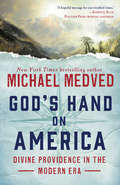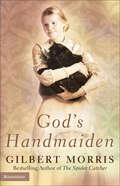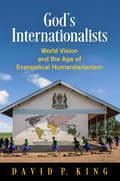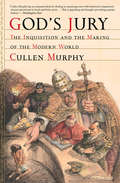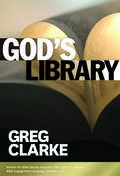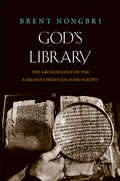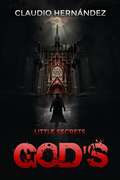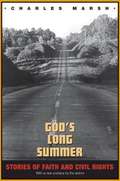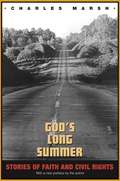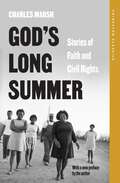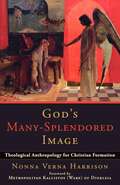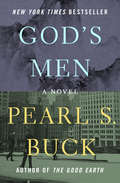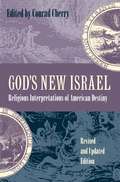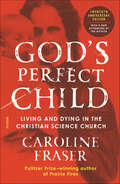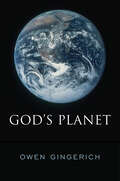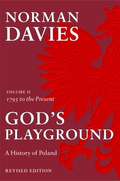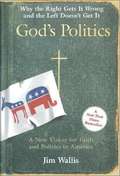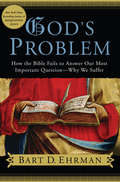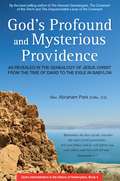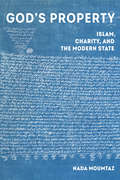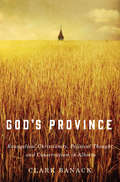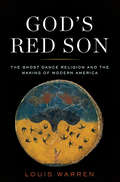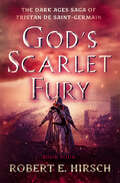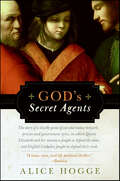- Table View
- List View
God's Hand on America: Divine Providence in the Modern Era
by Michael MedvedThe national radio host and bestselling author of The American Miracle reveals the happy accidents, bizarre coincidences, and flat-out miracles that continue to shape America&’s destiny. &“A hopeful message for our troubled times . . . Michael Medved has an eye for a story, and a preternatural gift for telling it in beguiling ways.&”—Joseph J. Ellis, Pulitzer Prize and National Book Award–winning author of Founding Brothers Has God withdrawn his special blessing from the United States? Americans ponder that painful question in troubled times, as we did during the devastation of the Civil War and after the assassinations of the &’60s, and as we do in our present polarization. Yet somehow—on battlefields, across western wilderness, and in raucous convention halls—astounding events have reliably advanced America, restoring faith in the Republic&’s providential protection. In this provocative historical narrative, Michael Medved brings to life ten haunting tales that reveal this purposeful pattern, including: • A near-fatal carriage accident forces Lincoln&’s secretary of state into a canvas-and-steel neck brace that protects him from a would-be assassin&’s knife thrusts, allowing him two years later to acquire Alaska for the United States. • A sudden tidal wave of Russian Jewish immigration, beginning in 1881, coincides with America&’s rise to world leadership, fulfilling a biblical promise that those blessing Abraham&’s children will themselves be blessed. • Campaigning for president, Theodore Roosevelt takes a bullet in the chest, but a folded speech in his jacket pocket slows its progress and saves his life. • At the Battle of Midway, U.S. planes get lost over empty ocean and then miraculously reconnect for five minutes of dive-bombing that wrecks Japan&’s fleet, convincing even enemy commanders that higher powers intervened against them. • A behind-the-scenes &“conspiracy of the pure of heart&” by Democratic leaders forces a gravely ill FDR to replace his sitting vice president—an unstable Stalinist—with future White House great Harry Truman. These and other little-known stories build on themes of The American Miracle, Medved&’s bestseller about America&’s remarkable rise. The confident heroes and stubborn misfits in these pages shared a common faith in a master plan, which continues to unfold in our time. God&’s Hand on America confirms that the founders were right about America&’s destiny to lead and enlighten the world.
God's Handmaiden
by Gilbert MorrisA historical and romantic adventure woven around the story of Florence Nightingale.Gervase Howard is in her mid-teens when her working-class mother dies and she must go to live with relatives in service to a wealthy, noble family, outside of London. While learning various jobs, she is drawn to the eldest son, Davis. Her fascination with him grows deeper, but more hopeless, since the two are separated not just by class, but also by Davis’s love for Roberta.When Davis announces his engagement, he asks Gervase to join them as Roberta’s maid. But instead Gervase becomes a companion to Florence Nightingale and accompanies her when the Crimean War breaks out and she is asked to create a corps of nurses. On the field, Gervase crosses paths with Davis, who has become disillusioned in his marriage and is drawn to her warmth and care. Both know, however, there is nothing more for them than friendship.Upon her return to England, Gervase receives word that Davis has been seriously injured in a fall and is asked to nurse him back to health. As he regains consciousness, he reveals shocking news that plunges them both into danger.
God's Internationalists: World Vision and the Age of Evangelical Humanitarianism (Haney Foundation Series)
by David P. KingOver the past seventy years, World Vision has grown from a small missionary agency to the largest Christian humanitarian organization in the world, with 40,000 employees, offices in nearly one hundred countries, and an annual budget of over $2 billion. While founder Bob Pierce was an evangelist with street smarts, the most recent World Vision U.S. presidents move with ease between megachurches, the boardrooms of Fortune 500 companies, and the corridors of Capitol Hill. Though the organization has remained decidedly Christian, it has earned the reputation as an elite international nongovernmental organization managed efficiently by professional experts fluent in the language of both marketing and development.God's Internationalists is the first comprehensive study of World Vision—or any such religious humanitarian agency. In chronicling the organization's transformation from 1950 to the present, David P. King approaches World Vision as a lens through which to explore shifts within post-World War II American evangelicalism as well as the complexities of faith-based humanitarianism. Chronicling the evolution of World Vision's practices, theology, rhetoric, and organizational structure, King demonstrates how the organization rearticulated and retained its Christian identity even as it expanded beyond a narrow American evangelical subculture. King's pairing of American evangelicals' interactions abroad with their own evolving identity at home reframes the traditional narrative of modern American evangelicalism while also providing the historical context for the current explosion of evangelical interest in global social engagement. By examining these patterns of change, God's Internationalists offers a distinctive angle on the history of religious humanitarianism.
God's Jury: The Inquisition and the Making of the Modern World
by Cullen Murphy&“From Torquemada to Guantánamo and beyond, Cullen Murphy finds the &‘inquisitorial impulse&’ alive, and only too well, in our world&” (Jane Mayer, author of Dark Money). Established by the Catholic Church in 1231, the Inquisition continued in one form or another for almost seven hundred years. Though associated with the persecution of heretics and Jews—and with burning at the stake—its targets were more numerous, its techniques were more ambitious, and its effect on history has been greater than many understand. The Inquisition pioneered surveillance, censorship, and &“scientific&” interrogation. As time went on, its methods and mindset spread far beyond the Church to become tools of secular persecution. Traveling from freshly opened Vatican archives to the detention camps of Guantánamo to the filing cabinets of the Third Reich, the author of Are We Rome? &“masterfully traces the social, legal and political evolution of the Inquisition and the inquisitorial process from its origins in late medieval Christian France to its eerily familiar, secular cousin in the modern world&” (San Francisco Chronicle). &“God&’s Jury is a reminder, and we need to be constantly reminded, that the most dangerous people in the world are the righteous, and when they wield real power, look out. . . . Murphy wears his erudition lightly, writes with quiet wit, and has a delightful way of seeing the past in the present.&” —Mark Bowden, author of Hue 1968 &“Beautifully written, very smart, and devilishly engaging.&” —The Boston Globe
God's Library
by Greg ClarkeIf you have called someone the apple of your eye, a lily among thorns or the salt of the earth, you have been quoting the Bible. But did you know it? The Bible is the bestselling book of all time. It has changed the course of nations, inspired many of the world's great works of art, culture, philanthropy and architecture. But how many people today know what it says? God's Library is designed to persuade the sceptical reader just how essential it is to be educated in the Bible. It also introduces you to the kind of literature that is found in the Good Book, when it was written and for what purposes. It also tries to answer the question why the Bible has had such an enormous influence on individuals and societies for over two thousand years. Greg Clarke is the CEO of Bible Society Australia and teaches at the University of Sydney and Macquarie University.
God's Library: The Archaeology of the Earliest Christian Manuscripts
by Brent NongbriA provocative book from a highly original scholar, challenging much of what we know about early Christian manuscripts In this bold and groundbreaking book, Brent Nongbri provides an up-to-date introduction to the major collections of early Christian manuscripts and demonstrates that much of what we thought we knew about these books and fragments is mistaken. While biblical scholars have expended much effort in their study of the texts contained within our earliest Christian manuscripts, there has been a surprising lack of interest in thinking about these books as material objects with individual, unique histories. We have too often ignored the ways that the antiquities market obscures our knowledge of the origins of these manuscripts. Through painstaking archival research and detailed studies of our most important collections of early Christian manuscripts, Nongbri vividly shows how the earliest Christian books are more than just carriers of texts or samples of handwriting. They are three-dimensional archaeological artifacts with fascinating stories to tell, if we’re willing to listen.
God's Little Secrets
by Claudio HernandezTitle: God’s Little Secrets A bloodthirsty killer on the loose, the perverse antics of Catholic priests exposed to the world, and a Vatican City in fear and turmoil. These are the essential ingredients of God’s Little Secrets. Inspector Chad Chamberlain of EUROPOL, the European Union’s division of INTERPOL, has been called in to investigate a mysterious find in Notre Dame. But the dismembered bodies found behind a false wall in the old Parisian cathedral are just the start, as more victims start popping up in different parts of Europe, especially in the Vatican. Chad Chamberlain and his sidekick Mohamed Khan go on the trail of the killer. However, it becomes clear that the killings aren’t just random acts of bloodthirsty violence but follow a pattern of scores being settled and a vengeful wrath as if it had come from God himself. A vengeance visited upon those who have indulged in one of the most evil of sins: the sexual abuse of children.
God's Long Summer: Stories of Faith and Civil Rights
by Charles MarshIn the summer of 1964, the turmoil of the civil rights movement reached its peak in Mississippi, with activists across the political spectrum claiming that God was on their side in the struggle over racial justice. This was the summer when violence against blacks increased at an alarming rate and when the murder of three civil rights workers in Mississippi resulted in national media attention. Charles Marsh takes us back to this place and time, when the lives of activists on all sides of the civil rights issue converged and their images of God clashed. He weaves their voices into a gripping narrative: a Ku Klux Klansman, for example, borrows fiery language from the Bible to link attacks on blacks to his "priestly calling"; a middle-aged woman describes how the Gospel inspired her to rally other African Americans to fight peacefully for their dignity; a SNCC worker tells of harrowing encounters with angry white mobs and his pilgrimage toward a new racial spirituality called Black Power. Through these emotionally charged stories, Marsh invites us to consider the civil rights movement anew, in terms of religion as a powerful yet protean force driving social action. The book's central figures are Fannie Lou Hamer, who "worked for Jesus" in civil rights activism; Sam Bowers, the Imperial Wizard of the White Knights of the Ku Klux Klan of Mississippi; William Douglas Hudgins, an influential white Baptist pastor and unofficial theologian of the "closed society"; Ed King, a white Methodist minister and Mississippi native who campaigned to integrate Protestant congregations; and Cleveland Sellers, a SNCC staff member turned black militant. Marsh focuses on the events and religious convictions that led each person into the political upheaval of 1964. He presents an unforgettable American social landscape, one that is by turns shameful and inspiring. In conclusion, Marsh suggests that it may be possible to sift among these narratives and lay the groundwork for a new thinking about racial reconciliation and the beloved community. He maintains that the person who embraces faith's life-affirming energies will leave behind a most powerful legacy of social activism and compassion.
God's Long Summer: Stories of Faith and Civil Rights
by Charles MarshIn the summer of 1964, the turmoil of the civil rights movement reached its peak in Mississippi, with activists across the political spectrum claiming that God was on their side in the struggle over racial justice. This was the summer when violence against blacks increased at an alarming rate and when the murder of three civil rights workers in Mississippi resulted in national media attention. Charles Marsh takes us back to this place and time, when the lives of activists on all sides of the civil rights issue converged and their images of God clashed. He weaves their voices into a gripping narrative: a Ku Klux Klansman, for example, borrows fiery language from the Bible to link attacks on blacks to his "priestly calling"; a middle-aged woman describes how the Gospel inspired her to rally other African Americans to fight peacefully for their dignity; a SNCC worker tells of harrowing encounters with angry white mobs and his pilgrimage toward a new racial spirituality called Black Power. Through these emotionally charged stories, Marsh invites us to consider the civil rights movement anew, in terms of religion as a powerful yet protean force driving social action. The book's central figures are Fannie Lou Hamer, who "worked for Jesus" in civil rights activism; Sam Bowers, the Imperial Wizard of the White Knights of the Ku Klux Klan of Mississippi; William Douglas Hudgins, an influential white Baptist pastor and unofficial theologian of the "closed society"; Ed King, a white Methodist minister and Mississippi native who campaigned to integrate Protestant congregations; and Cleveland Sellers, a SNCC staff member turned black militant. Marsh focuses on the events and religious convictions that led each person into the political upheaval of 1964. He presents an unforgettable American social landscape, one that is by turns shameful and inspiring. In conclusion, Marsh suggests that it may be possible to sift among these narratives and lay the groundwork for a new thinking about racial reconciliation and the beloved community. He maintains that the person who embraces faith's life-affirming energies will leave behind a most powerful legacy of social activism and compassion.
God's Long Summer: Stories of Faith and Civil Rights (Princeton Classics #142)
by Charles MarshIn the summer of 1964, the turmoil of the civil rights movement reached its peak in Mississippi, with activists across the political spectrum claiming that God was on their side in the struggle over racial justice. This was the summer when violence against blacks increased at an alarming rate and when the murder of three civil rights workers in Mississippi resulted in national media attention. Charles Marsh takes us back to this place and time, when the lives of activists on all sides of the civil rights issue converged and their images of God clashed. He weaves their voices into a gripping narrative: a Ku Klux Klansman, for example, borrows fiery language from the Bible to link attacks on blacks to his "priestly calling"; a middle-aged woman describes how the Gospel inspired her to rally other African Americans to fight peacefully for their dignity; a SNCC worker tells of harrowing encounters with angry white mobs and his pilgrimage toward a new racial spirituality called Black Power. Through these emotionally charged stories, Marsh invites us to consider the civil rights movement anew, in terms of religion as a powerful yet protean force driving social action.The book's central figures are Fannie Lou Hamer, who "worked for Jesus" in civil rights activism; Sam Bowers, the Imperial Wizard of the White Knights of the Ku Klux Klan of Mississippi; William Douglas Hudgins, an influential white Baptist pastor and unofficial theologian of the "closed society"; Ed King, a white Methodist minister and Mississippi native who campaigned to integrate Protestant congregations; and Cleveland Sellers, a SNCC staff member turned black militant.Marsh focuses on the events and religious convictions that led each person into the political upheaval of 1964. He presents an unforgettable American social landscape, one that is by turns shameful and inspiring. In conclusion, Marsh suggests that it may be possible to sift among these narratives and lay the groundwork for a new thinking about racial reconciliation and the beloved community. He maintains that the person who embraces faith's life-affirming energies will leave behind a most powerful legacy of social activism and compassion.
God's Many-Splendored Image: Theological Anthropology for Christian Formation
by Baker Publishing Group Staff Nonna Verna Harrison Metropolitan Kallistos Ware Of Diokleia StaffWhat does it mean to be a human being made in the image of God? This book makes the case that the divine image can be seen in not just one or two aspects of human identity but in all of them. The author, a specialist in early Christianity, reveals the light that leading theologians of the early church shed on contemporary discussions of what it means to be human. Each chapter explores a different facet of the divine image and likeness and maps out a path that can lead toward wholeness and holiness. This fresh approach to theological anthropology brings Greek patristic theology to students in a readable fashion.
God's Men: A Novel (Los Jet De Plaza Y J Series)
by Pearl S. BuckYouthful friends in turn-of-the-century China reunite years later in America, in this New York Times bestseller by the author of The Good Earth. This deeply felt novel tells the story of William Lane and Clem Miller, Americans who meet in China as youths at the end of the nineteenth century. Separated by the Boxer Rebellion, they&’re destined to travel wildly different courses in life. From a background of wealth and privilege, William becomes a power-hungry and controlling media magnate. By contrast, Clem, whose family survived on charity growing up, is engrossed by a project—which he works on ceaselessly, perhaps naively, together with his chemist wife—to eliminate world poverty. The two wind up in America and meet again, each successful in his own area, and as similar in their intensity as they are different in their values. God&’s Men is a rich and layered portrayal of lives set alight by ambition. This ebook features an illustrated biography of Pearl S. Buck including rare images from the author&’s estate.
God's New Israel
by Conrad CherryThe belief that America has been providentially chosen for aspecial destiny has deep roots in the country's past. As both astimulus of creative American energy and a source of Americanself-righteousness, this notion has long served as a motivatingnational mythology. God's New Israel is a collection of thirty-one readings that trace the theme of American destiny under God through major developments in U.S. history. First published in 1971 and now thoroughly updated to reflect contemporary events, it features the words of such prominent and diverse Americans as Jonathan Edwards, Thomas Jefferson, Brigham Young, Chief Seattle, Abraham Lincoln, Frances Willard, Martin Luther King Jr., Malcolm X, Ralph Reed, and Rosemary Radford Ruether. Neither a history of American religious denominations nor a history of American theology, this book is instead an illuminating look at how religion has helped shape Americans' understanding of themselves as a people.
God's Perfect Child: Living and Dying in the Christian Science Church
by Caroline FraserFrom Pulitzer Prize-winning author and former Christian Scientist Caroline Fraser comes the first unvarnished account of one of America's most controversial and little-understood religious movements.Millions of Americans – from Lady Astor to Ginger Rogers to Watergate conspirator H. R. Haldeman – have been touched by the Church of Christ, Scientist. Founded by Mary Baker Eddy in 1879, Christian Science was based on a belief that intense contemplation of the perfection of God can heal all ills – an extreme expression of the American faith in self-reliance. In this unflinching investigation, Caroline Fraser, herself raised in a Scientist household, shows how the Church transformed itself from a small, eccentric sect into a politically powerful and socially respectable religion, and explores the human cost of Christian Science's remarkable rise.Fraser examines the strange life and psychology of Mary Baker Eddy, who lived in dread of a kind of witchcraft she called Malicious Animal Magnetism. She takes us into the closed world of Eddy's followers, who refuse to acknowledge the existence of illness and death and reject modern medicine, even at the cost of their children's lives. She reveals just how Christian Science managed to gain extraordinary legal and Congressional sanction for its dubious practices and tracks its enormous influence on new-age beliefs and other modern healing cults.A passionate exposé of zealotry, God's Perfect Child tells one of the most dramatic and little-known stories in American religious history.
God's Planet
by Owen GingerichAn “eminent scholar . . . shows how religious perspectives have played significant roles in major scientific discoveries and frameworks. . . . fascinating.” (Choice)Today, science and religion are the two major cultural entities on our planet that seek a coherent explanation for the structure, origins, and fate of the universe, and of humanity’s place within it, though their interpretation of evidence differs dramatically. Many scientists look at the known universe and conclude we are here by chance. The renowned astronomer and historian of science Owen Gingerich looks at the same evidence?along with the fact that the universe is comprehensible to our minds?and sees it as proof for the planning and intentions of a Creator-God. God’s Planet exposes the fallacy in thinking that science and religion can be kept apart.Gingerich frames his argument around three questions: Was Copernicus right, in dethroning Earth from its place at the center of the universe? Was Darwin right, in placing humans securely in an evolving animal kingdom? And was Hoyle right, in identifying physical constants in nature that seem singularly tuned to allow the existence of intelligent life on planet Earth? Using these episodes from the history of science, Gingerich demonstrates that cultural attitudes, including religious or antireligious beliefs, play a significant role in what passes as scientific understanding. The more rigorous science becomes over time, the more clearly God’s handiwork can be comprehended.“Owen Gingerich provides new facts and deeper understanding of [Copernicus, Darwin, Hoyle].” —Freeman Dyson, author of The Scientist as Rebel“[A] short, punchy, accessible, and thought-provoking book.” —Christian Century“A rich volume you’ll want to keep in your library.” —Forbes.com
God's Playground: 1795 to the Present
by Norman DaviesThe most comprehensive survey of Polish history available in English, God's Playground demonstrates Poland's importance in European history from medieval times to the present. Abandoning the traditional nationalist approach to Polish history, Norman Davies instead stresses the country's rich multinational heritage and places the development of the Jewish German, Ukrainian, and Lithuanian communities firmly within the Polish context. Davies emphasizes the cultural history of Poland through a presentation of extensive poetical, literary, and documentary texts in English translation. In each volume, chronological chapters of political narrative are interspersed with essays on religious, social, economic, constitutional, philosophical, and diplomatic themes. This new edition has been revised and fully updated with two new chapters to bring the story to the end of the twentieth century.
God's Politics: Why the Right Gets It Wrong and the Left Doesn't Get It
by Jim WallisJim Wallis, the editor of Sojouners magazine, explains why he thinks the "Right" is mis-using religion in politics and the "Left" is afraid to use religion in politics.
God's Presence
by Frances YoungIn 2011, Frances Young delivered the Bampton Lectures in Oxford to great acclaim. She offered a systematic theology with contemporary coherence, by engaging in conversation with the fathers of the church - those who laid down the parameters of Christian theology and enshrined key concepts in the creeds - and exploring how their teachings can be applied today, despite the differences in our intellectual and ecclesial environments. This book results from a thorough rewriting of those lectures in which Young explores the key topics of Christian doctrine in a way that is neither simply dogmatic nor simply historical. She addresses the congruence of head and heart, through academic and spiritual engagement with God's gracious accommodation to human limitations. Christianity and biblical interpretation are discussed in depth, and the book covers key topics including Creation, anthropology, Christology, soteriology, spirituality, ecclesiology and Mariology, making it invaluable to those studying historical and constructive theology.
God's Problem: How the Bible Fails to Answer Our Most Important Question--Why We Suffer (The A to Z Guide Series, No. 194)
by Bart D. EhrmanOne Bible, Many AnswersIn God's Problem, the New York Times bestselling author of Misquoting Jesus challenges the contradictory biblical explanations for why an all-powerful God allows us to suffer.
God's Profound and Mysterious Providence
by Abraham ParkThe fourth book in the History of Redemption Series by Rev. Abraham Park, God's Profound and Mysterious Providence: As Revealed in the Genealogy of Jesus Christ from the time of David to the Exile in Babylon begins with accounts of King David and Solomon, then continues into the era of divided kingdoms: the northern kingdom of Israel and the southern kingdom of Judah. This book illustrates the reigns and lives of the kings from the perspective of God's administration for redemptive history.
God's Property: Islam, Charity, and the Modern State (Islamic Humanities #3)
by Nada MoumtazA free open access ebook is available upon publication. Learn more at www.luminosoa.org.Up to the twentieth century, Islamic charitable endowments provided the material foundation of the Muslim world. In Lebanon, with the fall of the Ottoman Empire and the imposition of French colonial rule, many of these endowments reverted to private property circulating in the marketplace. In contemporary Beirut, however, charitable endowments have resurfaced as mosques, Islamic centers, and nonprofit organizations. A historical anthropology in dialogue with Islamic law, God's Property demonstrates how these endowments have been drawn into secular logics—no longer the property of God but of the Muslim community—and shaped by the modern state and modern understandings of charity and property. Although these transformations have produced new kinds of loyalties and new ways of being in society, Moumtaz’s ethnography reveals the furtive persistence of endowment practices that perpetuate older ways of thinking of one’s self and one’s responsibilities toward family and state.
God's Province: Evangelical Christianity, Political Thought, and Conservatism in Alberta
by Clark BanackCompared to the United States, it is assumed that religion has not been a significant factor in Canada’s political development. In God’s Province, Clark Banack challenges this assumption, showing that, in Alberta, religious motivation has played a vital role in shaping its political trajectory. For Henry Wise Wood, president of the United Farmers of Alberta from 1916 until 1931, William "Bible Bill" Aberhart, founder of the Alberta Social Credit Party and premier from 1935 until 1943, Aberhart’s protégé Ernest Manning, Alberta’s longest serving premier (1943–1968), and Manning’s son Preston, founder of the Alberta-based federal Reform Party of Canada, religion was central to their thinking about human agency, the purpose of politics, the role of the state, the nature of the economy, and the proper duties of citizens. Drawing on substantial archival research and in-depth interviews, God’s Province highlights the strong link that exists between the religiously inspired political thought and action of these formative leaders, the US evangelical Protestant tradition from which they drew, and the emergence of an individualistic, populist, and anti-statist sentiment in Alberta that is largely unfamiliar to the rest of Canada. Covering nearly a century of Alberta’s history, Banack offers an illuminating reconsideration of the political thought of these leaders, the goals of the movements they led, and the roots of Alberta’s distinctiveness within Canada. A fusion of religious history, intellectual history, and political thought, God’s Province exposes the ways in which individual politicians have shaped one province’s political culture.
God's Red Son: The Ghost Dance Religion and the Making of Modern America
by Louis S. WarrenIn 1890, on Indian reservations across the West, followers of a new religion danced in circles until they collapsed into trances. In an attempt to suppress this new faith, the US Army killed over two hundred Lakota Sioux at Wounded Knee Creek. Louis Warren's God's Red Son offers a startling new view of the religion known as the Ghost Dance, from its origins in the visions of a Northern Paiute named Wovoka to the tragedy in South Dakota. To this day, the Ghost Dance remains widely mischaracterized as a primitive and failed effort by Indian militants to resist American conquest and return to traditional ways. In fact, followers of the Ghost Dance sought to thrive in modern America by working for wages, farming the land, and educating their children, tenets that helped the religion endure for decades after Wounded Knee. God's Red Son powerfully reveals how Ghost Dance teachings helped Indians retain their identity and reshape the modern world.
God's Scarlet Fury (The Dark Ages Saga of Tristan de Saint-Germain #Vol. 4)
by Robert E. HirschA bishop&’s vows are tested by the epic eleventh-century battle between East and West, in this compelling novel of the Crusades. It is the year 1097. The violent warrior class of Western Europe is marching against the Islamic Seljuk Empire to recapture Jerusalem at the plea of Pope Urban II, igniting a searing inferno of war, betrayal, and intrigue as two worlds collide—East against West, Christians against Muslims. Caught in this vicious conflict, Bishop Tristan de Saint-Germain strives to balance religious vows, loyalty to the pope, and his life-long love for Mala the Romani, the beautiful girl he met as a child just before entering the monastery of the Black Monks in France. Tested by separations, the death of their firstborn child, the threat of eternal damnation, and now annihilation, Tristan and Mala struggle against the raging tides of cultural and religious intolerance to remain together in an age of inflexible Catholic doctrine and holy war. Finding support in Queen Irene and Emperor Alexius of Byzantium, they are challenged by Archbishop Adhémar of Le Puy, rigid moralist and leader of the First Holy Crusade; Tafur, the perverse &“Beggar King&”; and Lord Desmond DuLac, hated specter of the Saint-Germain family past. Time alone shall direct the outcome as humanity awakens the wrathful hand of God&’s scarlet fury
God's Secret Agents: The Story of a Deadly Game of Cat and Mouse between Priests and Government Spies, in which Queen Elizabeth and Her Ministers Fought to Defend the State, and English Catholics Fought to Defend Their Souls
by Alice HoggeOne evening in 1588, just weeks after the defeat of the Spanish Armada, two young men landed in secret on a beach in Norfolk, England. They were Jesuit priests, Englishmen, and their aim was to achieve by force of argument what the Armada had failed to do by force of arms: return England to the Catholic Church.Eighteen years later their mission would be shattered by the actions of the Gunpowder Plotters -- a small group of terrorists who famously tried to destroy the Houses of Parliament -- for the Jesuits were accused of having designed "that most horrid and hellish conspiracy."Alice Hogge follows "God's secret agents" from their schooling on the Continent, through their perilous return journeys and lonely lives in hiding, to, ultimately, the gallows. She offers a remarkable true account of faith, duty, intolerance, and martyrdom -- the unforgettable story of men who would die for a cause undone by men who would kill for it.
